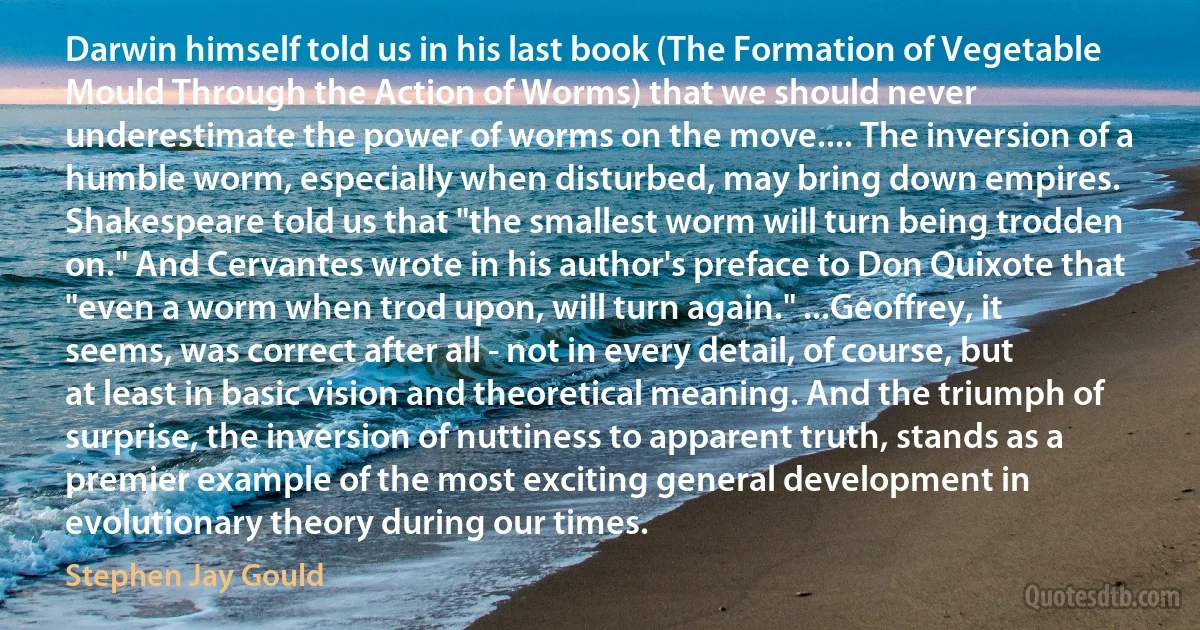Shakespeare Quotes - page 8
I sit with Shakespeare and he winces not. Across the color-line I move arm in arm with Balzac and Dumas, where smiling men and welcoming women glide in gilded halls. From out the caves of the evening that swing between the strong-limbed earth and the tracery of the stars, I summon Aristotle and Aurelius and what soul I will, and they come all graciously with no scorn nor condescension. So, wed with Truth, I dwell above the Veil. Is this the life you grudge us, O knightly America? Is this the life you long to change into the dull red hideousness of Georgia? Are you so afraid lest peering from this high Pisgah, between Philistine and Amalekite, we sight the Promised Land?

W. E. B. Du Bois
When I was a boy I knew the Odes of Horace backwards and forwards, and when I came to manhood year by year those odes came knocking at the door of my heart at the most unexpected times and places. So, even if you do not realise it now, the time will come when you will be thankful that you were steeped in Shakespeare as boys. In him we not only have, as Sir Gerald du Maurier said here not long ago, perhaps the greatest man the world has ever seen, but one who had a profound knowledge of human nature and of the world. Shakespeare was one of those few poets in whom we find the magic which comes straight from heaven, and which is the prerogative of the very greatest...Shakespeare's plays, no matter of what country he may be writing, are redolent of our own soil and of our own country people. The habit of thought and the outlook of Shakespeare's country people and of those wise men, Shakespeare's fools, may be found to-day in our rural counties.

Stanley Baldwin
When I say that I can write nothing but weird fiction, I am not trying to exalt that medium but am merely confessing my own weakness. The reason I can't write other kinds is not that I don't value & respect them, but merely that my slender set of endowments does not enable me to extract a compellingly acute personal sense of interest & drama from the natural phenomena of life. I know that these natural phenomena are more important & significant than the special & tenuous moods which so absorb me, & that an art based on them is greater than any which fantasy could evoke-but I'm simply not big enough to react to them in the sensitive way necessary for artistic response & literary use. God in heaven! I'd certainly be glad enough to be a Shakespeare or Balzac or Turgeniev if I could!... I respect realism more than any other form of art-but must reluctantly concede that, through my own limitations, it does not form a medium which I can adequately use.

H. P. Lovecraft
Yes, Shakespeare foremost and forever (Darwin too). But also teach about the excellence of pygmy bushcraft and Fuegian survival in the world's harshest climate. Dignity and inspiration come in many guises. Would anyone choose the tinhorn patriotism of George Armstrong Custer over the eloquence of Chief Joseph in defeat?

Stephen Jay Gould
It was the White Race who produced men like Columbus who crossed the unknown Atlantic; men like Magellan who first circumnavigated the globe; men like Michaelangelo, Leonardo da Vinci, Rembrandt, Velazquez, Bernini, Rubens, Raphael and thousands of other geniuses who created beautiful and exquisite productions in the fields of sculpture and painting; geniuses like Beethoven, Bach, Wagner and Verdi who created beautiful music; men like James Watt who invented the steam engine; men like Daimler who invented and built the reciprocating internal combustion engine; production geniuses like Henry Ford, inventors like Thomas Edison; such a prodigal genius as Nikola Tesla in the field of physics and electricity; literary geniuses like Shakespeare, Goethe and thousands of others, untold geniuses in the fields of mathematics, in the fields of chemistry and physics.

Ben Klassen
What Elizabethan playwrights learned from the Greek classics was not theories of insanity, but dramatic practice - that is, madness is a dandy theatrical element. It focuses the audience's attention and increases suspense, since you never know what a mad person may get up to next; and Shakespeare himself makes use of it in many forms. In King Lear, there's a scene in which one man pretending to be mad, another who has really gone mad, and a third who has probably always been a little addled, are brought together for purposes of comparison, irony, pathos, and tour de force acting. In Hamlet, there are two variations - Hamlet himself, who assumes madness, and Ophelia, who really does go winsomely bonkers. In MacBeth, it's Lady MacBeth who snaps.

Margaret Atwood
Since Sputnik and the satellites, the planet is enclosed in a manmade environment that ends "Nature" and turns the globe into a repertory theater to be programmed. Shakespeare at the Globe mentioning "All the world's a stage, and all the men and women merely players" (As You Like It, Act II, Scene 7) has been justified by recent events in ways that would have struck him as entirely paradoxical. The results of living inside a proscenium arch of satellites is that the young now accept the public spaces of the earth as role-playing areas. Sensing this, they adopt costumes and roles and are ready to "do their thing" everywhere."

Marshall McLuhan
![Instead of opposing comic and tragic characters [as Molière and Shakespeare] and contrary scenic states, I organize the opposition of contrasting values, lines, and curves. I oppose curves to straight lines, flat surfaces to molded forms, pure local colors to nuances of gray. These initial plastic forms are either superimposed on objective elements or not, it makes no difference to me. There is only a question of variety. (Fernand Léger)](https://cdn.quotesdtb.com/img/quotes_images_webp/89/fernand-l-ger-comic-299189.webp)


